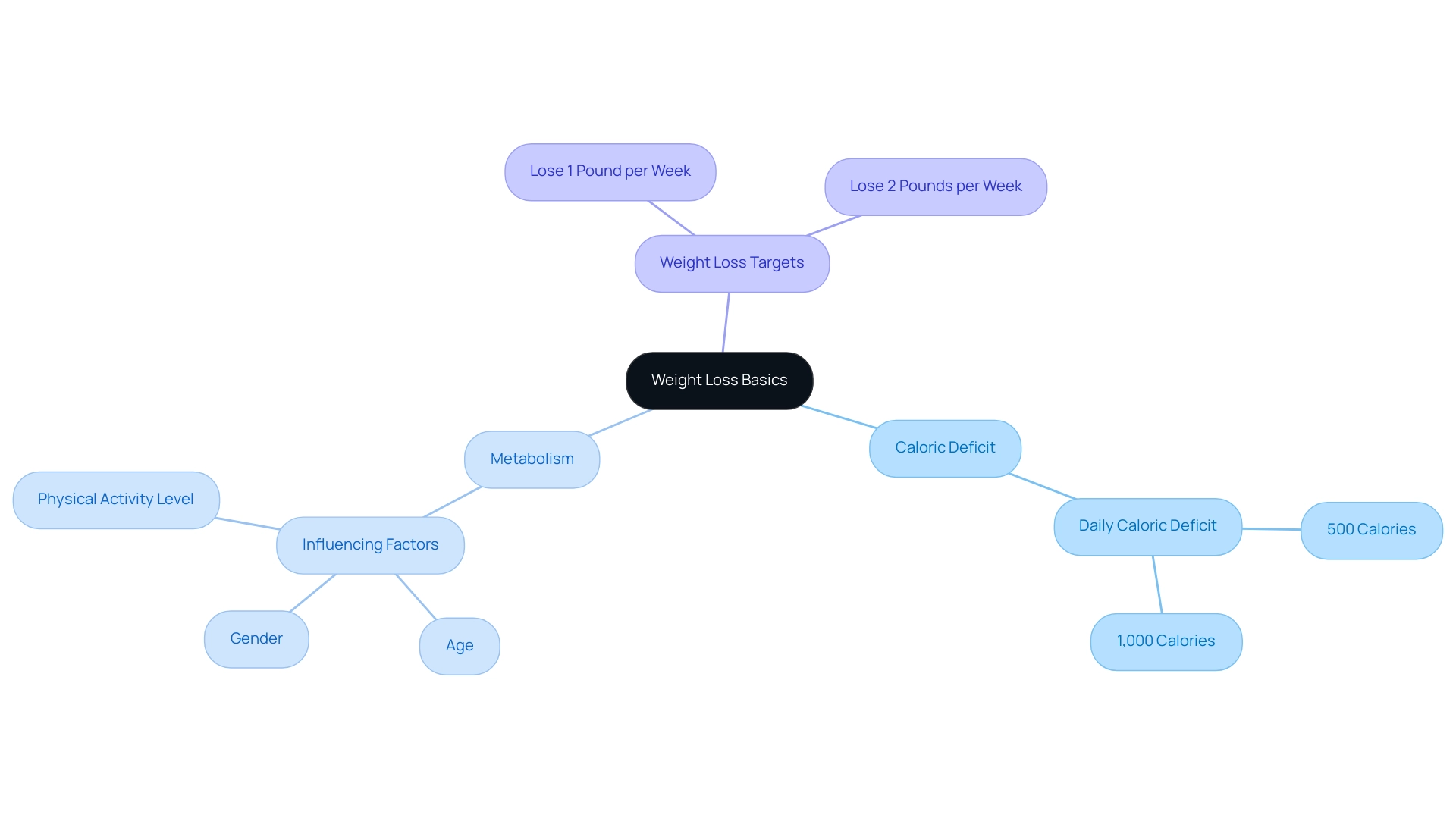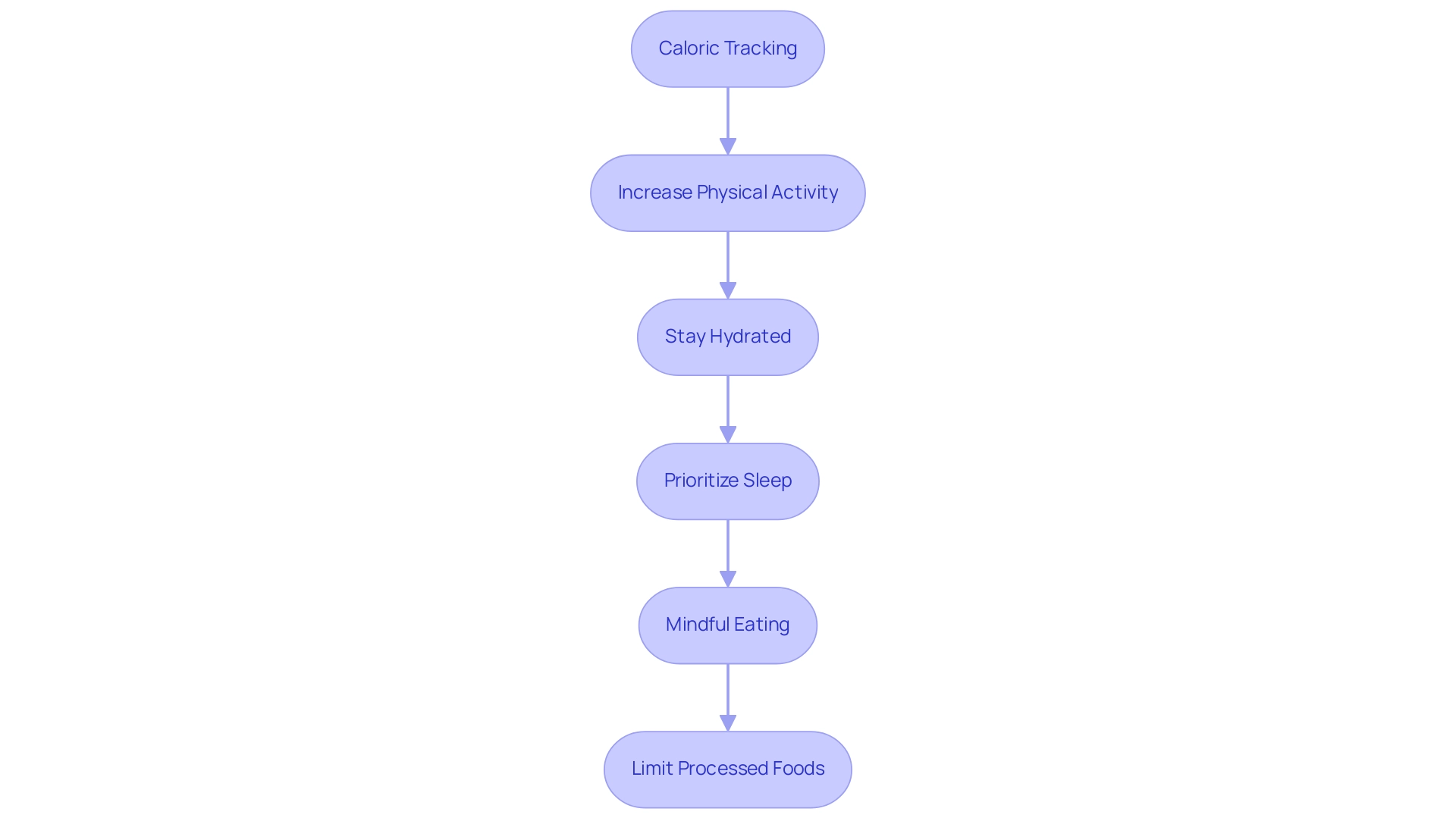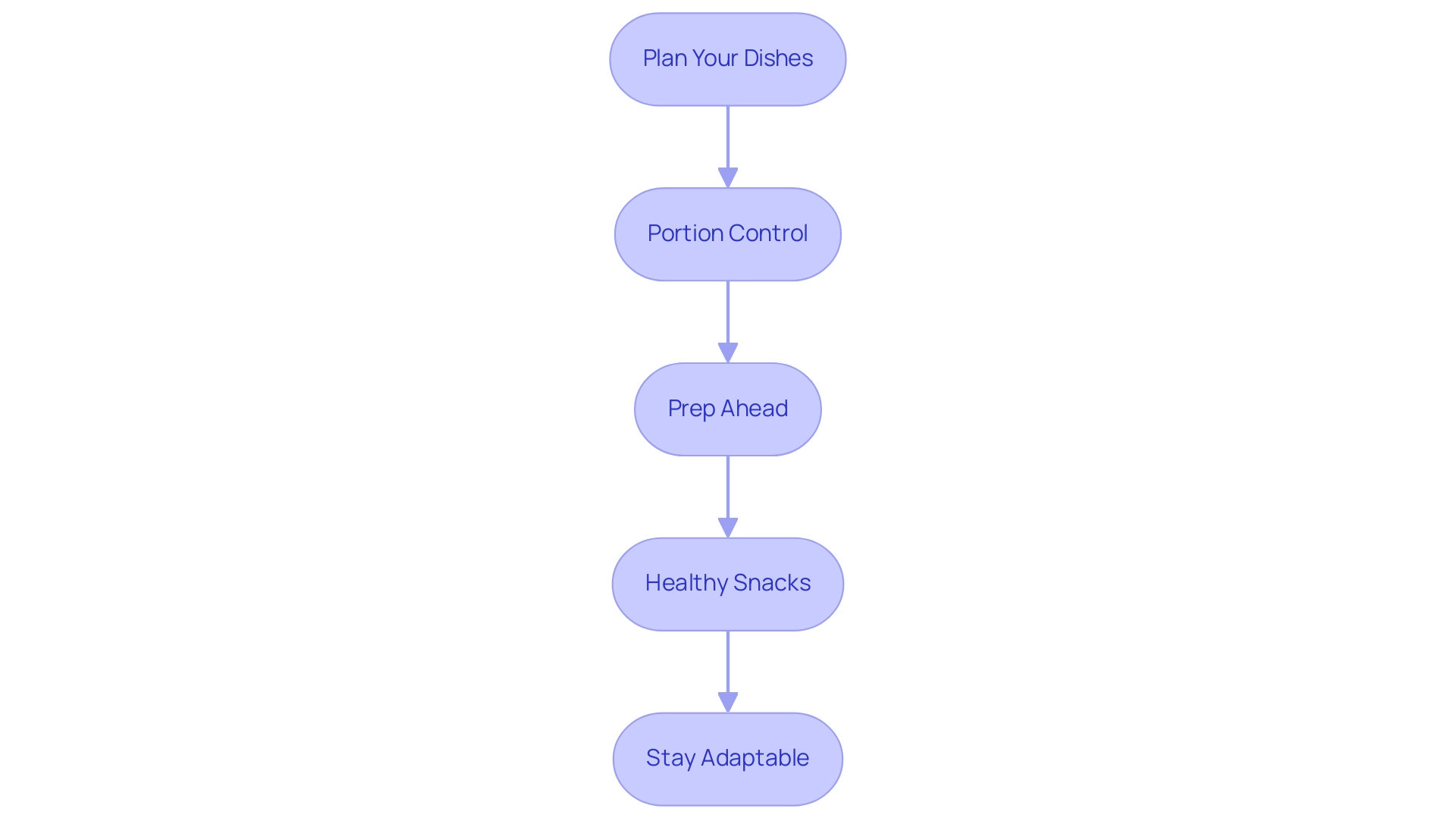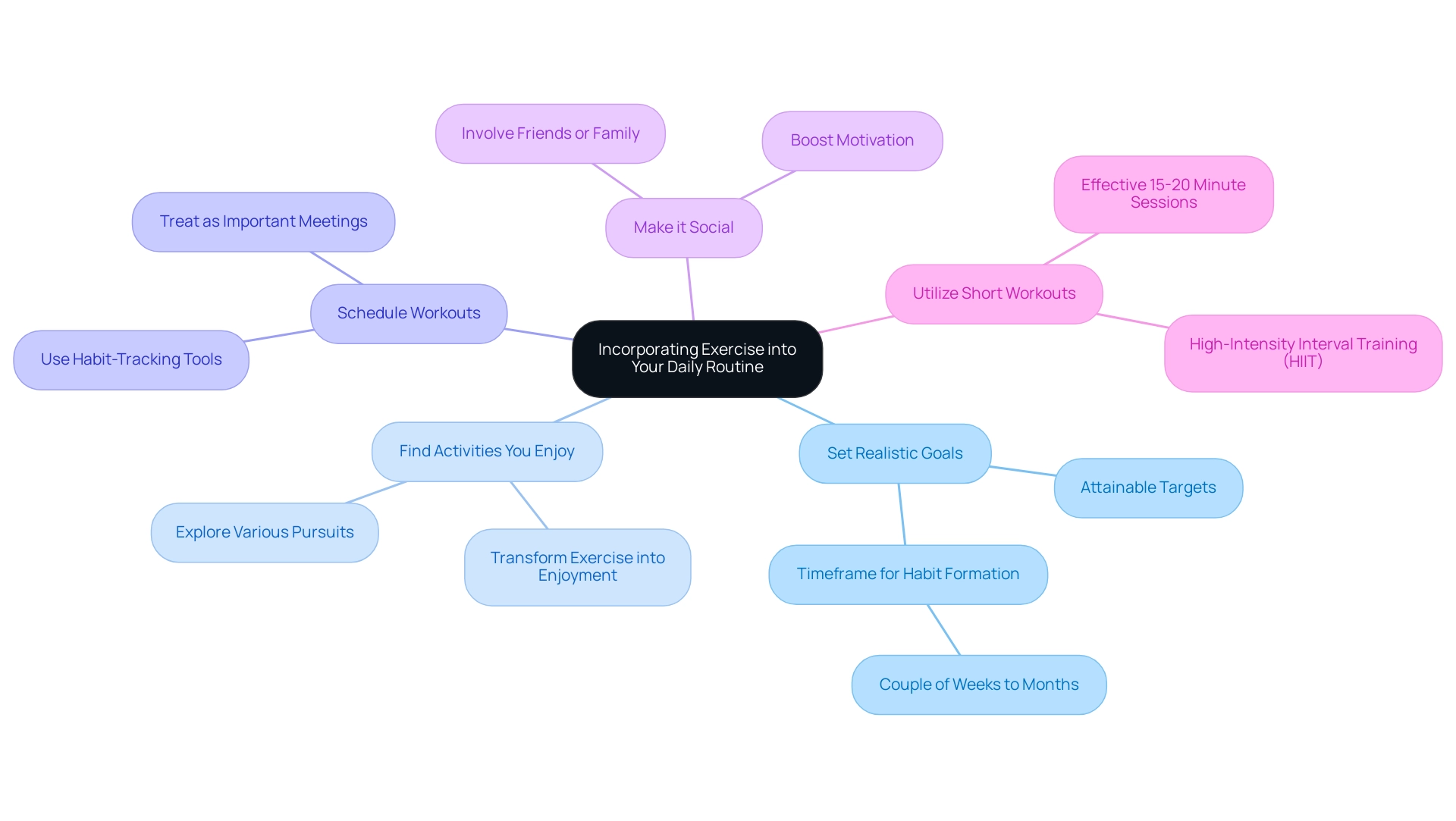Introduction
Embarking on a weight loss journey can be both exhilarating and daunting. With a myriad of information available, it’s easy to feel overwhelmed by the choices and strategies that promise results. However, understanding the fundamentals of weight loss is the first step towards achieving lasting change. This article serves as a comprehensive guide, offering practical strategies to shed those stubborn pounds while fostering a healthier lifestyle.
From creating a caloric deficit and tracking progress to incorporating enjoyable exercise routines, readers will discover actionable steps to empower their journey.
With the right mindset and tools, achieving weight loss goals becomes not just a possibility, but a rewarding reality.
Understanding the Basics of Weight Loss
To reduce body mass, you need to create a caloric deficit, meaning you burn more calories than you consume. Understanding your metabolism, which is the rate at which your body burns calories, is essential. Factors such as age, gender, and physical activity level influence your metabolic rate.
To understand how to lose 3 pounds in 1 week, aim for a caloric deficit of:
- 500 to 1,000 calories per day to lose approximately 1 to 2 pounds per week.
This foundational knowledge will empower you to make informed choices about your diet and physical activity, setting the stage for your weight loss journey.

Step-by-Step Strategies to Lose 3 Pounds in a Week
- Caloric Tracking: Start tracking your daily caloric intake using our app or a journal. Aim to reduce your daily intake by 500-750 calories, focusing on whole foods such as fruits, vegetables, lean proteins, and whole grains. Our personalized coaching can help you navigate this process effectively.
- Increase Physical Activity: Incorporate at least 30 minutes of moderate to vigorous physical activity into your daily routine. This could include brisk walking, cycling, or strength training. Our tailored fitness programs are designed to maximize your calorie burn through a mix of cardio and resistance exercises, ensuring you stay motivated and engaged.
- Stay Hydrated: Drink plenty of water throughout the day. Sometimes, our bodies confuse thirst with hunger. Aim for at least 8 glasses of water daily, and consider drinking a glass before meals to assist in controlling appetite. Our wellness app can remind you to stay hydrated and track your intake.
- Prioritize Sleep: Ensure you get 7-9 hours of quality sleep each night. Insufficient sleep can interfere with hormones that control hunger, resulting in heightened cravings and gain. Our coaching services can provide you with strategies to improve your sleep health.
- Mindful Eating: Practice mindful eating by paying attention to your hunger cues and eating slowly. This can assist you in recognizing when you are full and prevent overeating. Our workshops on nutrition can enhance your understanding of mindful eating practices.
- Limit Processed Foods: Reduce your intake of processed foods high in sugar and unhealthy fats. These foods can lead to an increase in mass and may not supply the nutrients your body requires. Our personalized nutrition guidance helps you make informed choices about your diet, and by following these strategies, supported by our comprehensive health coaching services, you can effectively learn how to lose 3 pounds in 1 week. Our app features tools for tracking your progress and accessing personalized coaching. Additionally, our clients have successfully achieved their weight loss goals, as evidenced by testimonials highlighting their journeys. Remember, consistency is key, and celebrating small victories along the way will keep you motivated. Sign up for our free 7-day trial today to start your journey towards a healthier lifestyle!

Creating a Balanced Meal Plan
To create a balanced food plan:
- Plan Your Dishes: Dedicate time each week to organize your food. Include a variety of proteins, whole grains, and plenty of fruits and vegetables.
- Portion Control: Use smaller plates and bowls to help control portions. Aim for a plate that is half-filled with vegetables, a quarter with lean protein, and a quarter with whole grains.
- Prep Ahead: Prepare dishes in advance to avoid the temptation of unhealthy options when you're busy. Consider batch cooking and storing dishes in portioned containers.
- Healthy Snacks: Incorporate nutritious snacks into your plan, such as nuts, yogurt, or fresh fruit, to maintain energy levels and avoid overeating at dining times.
- Stay Adaptable: Permit some flexibility in your meal plan to adjust for changes in schedule or cravings, but remain mindful of your overall objectives.
By adhering to these steps, you can develop a meal plan that demonstrates how to lose 3 pounds in 1 week while ensuring you feel satisfied and nourished.

Incorporating Exercise into Your Daily Routine
Including physical activity in your daily routine is not solely about losing weight; it's about promoting a healthier lifestyle and enhancing your well-being. Here are five impactful strategies to help you get started:
- Set Realistic Goals: Begin with attainable targets that fit into your lifestyle, such as committing to 10,000 steps per day or dedicating 30 minutes to physical activity three times a week. Research shows that integrating achievable goals is crucial for maintaining healthy habits over time. It typically takes anywhere between a couple of weeks to a couple of months of consistent practice to solidify a habit, making it essential to start with realistic expectations.
- Find Activities You Enjoy: Explore various pursuits and choose those that bring you joy—whether it's dancing, swimming, hiking, or participating in group classes. When you enjoy the activities, you're more likely to stick with them, transforming exercise from a chore into a delightful part of your day.
- Schedule Workouts: Treat your workout sessions with the same importance as business meetings by scheduling them into your calendar. Consistency is essential for habit formation, and setting specific times can strengthen your commitment. As highlighted in the case study "Keep It Real – Set Realistic Goals," using habit-tracking tools and accountability can help maintain new healthy habits over time.
- Make it Social: Involve friends or family in your fitness journey. Exercising with others not only boosts motivation but also adds a fun and social element to your routine. Accountability can be a powerful ally in achieving your fitness goals.
- Utilize Short Workouts: If you're pressed for time, consider high-intensity interval training (HIIT) or opt for shorter, effective workouts lasting just 15-20 minutes. Every effort matters, and even short sessions can contribute significantly to your overall fitness and fat loss success.
By integrating these strategies into your daily routine, you can learn how to lose 3 pounds in 1 week while simultaneously enhancing your overall fitness and well-being.
Testimonials:
- "Thanks to the personalized coaching, I not only shed pounds but also learned how to maintain a healthier lifestyle!" - Sarah L.
- "The support and guidance from my coach made all the difference in my fitness journey!" - Mark T.
Remember, small steps can lead to lifelong changes—let personalized coaching guide you in taking control of your health and well-being, starting today! Contact us to learn how we can support your team's health journey.

Tracking Progress and Staying Motivated
To track your progress and stay motivated:
-
Keep a Journal: Document your meals, workouts, and feelings throughout your journey of losing pounds. This can assist in identifying patterns and areas for improvement.
-
Use Apps: Consider using fitness and nutrition applications to monitor calories, exercise, and loss. Many apps offer community support, which can be motivating.
-
Regular Check-Ins: Weigh yourself once a week at the same time to monitor progress. Remember that fluctuations are normal, so focus on overall trends rather than daily changes.
-
Set Milestones: Break your goal into smaller milestones, such as how to lose 3 pounds in 1 week by losing 1 pound per week. Celebrate these achievements to maintain motivation.
-
Reflect on Your Why: Regularly remind yourself why you started this journey. Keeping your motivations at the forefront can help you push through challenges.
By actively tracking your progress and celebrating your achievements, you’ll maintain motivation and stay focused on your weight loss goals.
![]()
Conclusion
Embarking on a weight loss journey involves understanding key principles that pave the way for lasting change. Creating a caloric deficit is fundamental, as it ensures that more calories are burned than consumed. By tracking caloric intake, increasing physical activity, staying hydrated, prioritizing sleep, practicing mindful eating, and limiting processed foods, individuals can effectively progress towards their weight loss goals.
Integrating exercise into daily routines not only aids in weight loss but also promotes overall health and well-being. Setting realistic goals, finding enjoyable activities, scheduling workouts, involving friends for accountability, and making use of shorter workouts can transform physical activity into an engaging part of life.
Tracking progress through journaling, utilizing apps, and celebrating milestones helps maintain motivation throughout the journey. Reflecting on personal motivations and the reasons for starting this journey further reinforces commitment.
Ultimately, with the right mindset and practical strategies, achieving weight loss goals becomes an attainable reality. Embracing these steps fosters a healthier lifestyle and empowers individuals to take charge of their well-being. Now is the time to take action, celebrate small victories, and embark on a transformative journey towards a healthier, more vibrant self.




